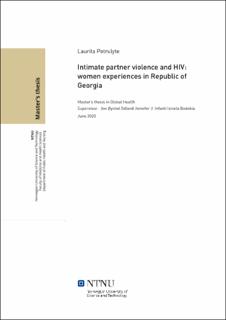| dc.description.abstract | Background. The human immunodeficiency virus (HIV) and intimate partner violence (IPV) continue to be two major global health concerns. The association between IPV and HIV has been the focus of a growing number of studies, however, the diverse South Caucasus region has been largely overlooked by academic scientists. There are a number of factors in Georgia, a highly religious lower-middle-income country in the South Caucasus region, that put women in an unsafe position for both HIV and IPV, such as lack of reproductive health education, gender inequality and male-favouring traditionalist attitudes.
Methodology. A qualitative study design was chosen in order to explore the IPV experiences of women living with HIV in Georgia. Focus group discussions (FGDs) were held with women facing similar experiences in safe and encouraging environments.
Findings. Four FGDs were conducted with a total of twenty HIV positive Georgian women. Almost half of participants shared being infected with HIV due to the previously unknown HIV positive status of their intimate partner or as a result of sexual violence. Twelve out of twenty participants shared experiencing domestic violence, perpetrated by their intimate partner and in some cases his family members. Most of them experienced violence for the first time after disclosing their HIV positive status. For the consequences HIV positive females who experienced different types of IPV have demonstrated repeated tendencies of past antiviral therapy disruptions, trauma and high levels of depression.
Conclusions. The findings from this study suggest an indisputable connection between HIV and IPV by them being a risk factor and a result of one another. Georgian women appear to be in a vulnerable position for both HIV and IPV because of lack of legal protection, HIV-related education and public acceptance of unequal gender power relations. However, since the study was conducted solely in the capital city of Tbilisi, further research in rural settings in Georgia is needed to gain a better understanding of the overall country situation. | |
